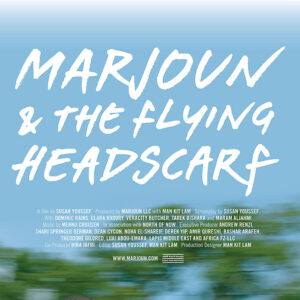calsfoundation@cals.org
Marjoun and the Flying Headscarf
Directed and written by Lebanese American Susan Youssef, Marjoun and the Flying Headscarf (2019) is a feature film made and set in and around Little Rock (Pulaski County), including at Central High School and rural Pulaski County. Filming also took place at Magnolia Grove Monastery, a Buddhist community in Batesville, Mississippi. Youssef had previously made one feature film and several shorts, including a 2006 short of the same title, Marjoun and the Flying Headscarf, which told a similar story with a different cast.
The feature’s young heroine, Marjoun, is played by Veracity Butcher, who is of mixed Moroccan and Cajun heritage. In Little Rock in 2006, the Lebanese American teenager faces many problems. She is angry that her father has been unjustly imprisoned by U.S. authorities for innocent cash transfers to relatives in Lebanon. At school, her little sister Jinane is bullied, and Marjoun is harassed for her style of dress, snapping at an annoying classmate, “How am I supposed to dress, like a whore like you?” At the same time, Marjoun is sexually harassed by Sami, an Americanized family “friend.” At home, her mother Amani is depressed, and Jinane is ostentatiously more devout than Marjoun.
Marjoun eventually decides to wear the hijab, the Muslim women’s headscarf denoting modesty, to ward off Sami and to show her commitment to her faith and community, in defiance of American bigotry. Her precarious position at the crossroads between two lifestyles is shown in a climactic scene in which Marjoun, pursued by a Pulaski County sheriff’s cruiser, races her motorcycle down a rural Arkansas road, her hijab streaming behind her.
The film shatters stereotypes of submissive Arab women. Marjoun, Amani, and Jinane are all highly assertive, and there is a phone call from Amani’s fierce mother in Lebanon, who has never forgiven her daughter for marrying a Shia man. However, these women spend most of the film quarreling with each other, rather than uniting against dangerous men, like Sami.
Youssef’s film attracted little attention from critics, but the actors are first-class, including child actor Maram Aljahmi as Jinane. Although the heroine is far from happy in Arkansas, cinematographers Hans Bouma and Guy Galloway show the beauty of Little Rock.
Although the film was released with little publicity, it was nominated for best film at the 2019 Miami Film Festival. A Variety reviewer (July 17, 2020) called the movie “an unwieldly array of provocative ideas…deeply felt but inconsistent…both over- and under-worked, bristling with ideas and issues and subplots that have but little connective tissue holding them together.”
Variety reports that Marjoun was a U.S.–Netherlands–Qatar–United Arab Emirates–Canada–Lebanon coproduction, making it likely the most international movie ever made in Arkansas. Marjoun was released online and to film festivals just a year before the much more celebrated release of Minari (2020), another independent film about a small immigrant community in Arkansas. The movie can be rented through the website Eventive.
For additional information:
Attab, Kaleed. “Susan Youssef: ‘Every Time I Make a Film I Learn More about Being an Arab in America.’” The National News, March 12, 2019. https://www.thenationalnews.com/arts-culture/film/susan-youssef-every-time-i-make-a-film-i-learn-more-about-being-an-arab-in-america-1.835872 (accessed June 5, 2021).
Marjoun and the Flying Headscarf. Eventive. https://watch.eventive.org/marjoun (accessed June 5, 2021).
“Marjoun and the Flying Headscarf.” Internet Movie Database. https://www.imdb.com/title/tt10399342/?ref_=rvi_tt (accessed June 5, 2021).
Marjoun and the Flying Headscarf. Official site. https://marjoun.com/ (accessed June 5, 2021).
Michael Klossner
Little Rock, Arkansas
 Arts, Culture, and Entertainment
Arts, Culture, and Entertainment Divergent Prosperity and the Arc of Reform, 1968–2022
Divergent Prosperity and the Arc of Reform, 1968–2022 Veracity Butcher
Veracity Butcher  Marjoun and the Flying Headscarf
Marjoun and the Flying Headscarf 




Comments
No comments on this entry yet.